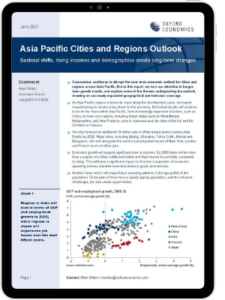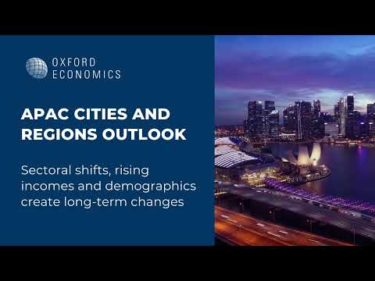APAC Cities Outlook | Sectoral shifts, rising incomes and demographics create long-term changes

Over the past twenty years parts of Asia Pacific have experienced some of the fastest economic growth globally. This trend is set to continue over the next fifteen years, with China and India continuing to lead Asia’s contribution to world GDP. In our latest APAC Cities and Regions Outlook, we explore some of the themes underpinning the outlook.
What you will learn:
- Sectoral shifts: As China transitions towards higher value, less labour-intensive manufacturing, there are opportunities for other lower wage Asian regions to take its place. We believe India and Indonesia are set to become Asia’s new industrial powerhouses.
- Rising income: Long-term economic growth will support rising incomes, helping millions of households move out of poverty and up through the income bands. Across the Asia Pacific region, there will be over 210 million additional middle-income households by 2035 compared to 2020.
- Ageing population: Ageing populations will pose challenges such as rising pension and healthcare costs, there will also be significant opportunities associated with the rise of the “silver economy”
If you would like to get access to our forecasts for 47 cities and sub regions in Asia Pacific, click here to submit a free trial request.

Tags:
Related Services

Post
Little by little—Manchester is closing the output gap
Greater Manchester has led the UK economy since 2008, driven by knowledge jobs, transport upgrades, and housing growth—but can prosperity reach its outer districts?
Find Out More
Post
Asia’s cities are reshaping the world
From Seoul to Delhi and Shanghai, Asia’s urban centres are rapidly overtaking global rivals as living standards soar. What will this mean for the balance of global economic power?
Find Out More